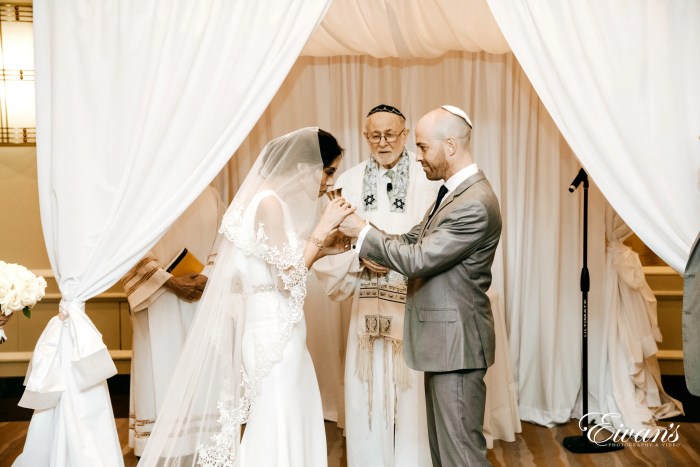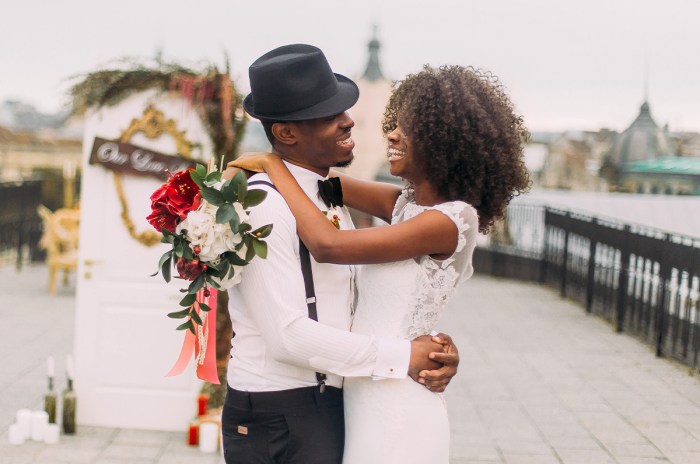Traditional Jewish Wedding Attire: Dress Code Jewish Wedding
Dress code jewish wedding – Jewish wedding attire varies significantly depending on the denomination (Orthodox, Conservative, Reform) and the level of formality of the event. Understanding these differences ensures respectful and appropriate attire for guests.
Orthodox Jewish Wedding Attire
Orthodox Jewish weddings typically adhere to strict dress codes emphasizing modesty and religious observance. The bride often wears a long-sleeved, modest gown, often white or ivory, avoiding anything revealing or overly flamboyant. The groom traditionally wears a dark suit and often a kippah (yarmulke).
Jewish wedding dress codes generally lean towards modest and celebratory attire. However, personal expression is also important; some couples embrace a more relaxed approach. For those seeking a unique style, a striking alternative might be a black lace gothic wedding dress , though it’s crucial to consider the overall tone of the wedding and the comfort level of the couple before making such a bold choice.
Ultimately, respecting the couple’s wishes remains paramount when choosing an outfit for a Jewish wedding.
Conservative Jewish Wedding Attire
Conservative Jewish weddings generally maintain a balance between tradition and modernity. Female guests typically wear modest dresses or skirts and blouses, avoiding excessively revealing clothing. Pantsuits are acceptable but should maintain a level of formality and modesty.
Reform Jewish Wedding Attire
Reform Jewish weddings tend to have more relaxed dress codes. Male guests often wear suits or sport jackets and slacks, while ties are optional. The level of formality often depends on the specific couple’s preferences and the venue.
Comparison of Dress Codes Across Denominations
The main difference lies in the level of modesty expected. Orthodox weddings emphasize the most modest attire, followed by Conservative, with Reform weddings often having the most relaxed dress code. However, even in Reform weddings, a respectful and somewhat formal approach is generally appreciated.
Acceptable and Unacceptable Attire at Jewish Weddings
| Denomination | Acceptable Attire (Women) | Acceptable Attire (Men) | Unacceptable Attire |
|---|---|---|---|
| Orthodox | Long-sleeved, modest dress or skirt and blouse; covered shoulders and knees | Suit, kippah | Short dresses, revealing tops, shorts, jeans |
| Conservative | Knee-length or longer dresses or skirts; modest tops; pantsuits (formal) | Suit or sport jacket and slacks; tie optional | Revealing necklines, overly short skirts, casual attire |
| Reform | Dresses, skirts, pantsuits; generally less restrictive but still respectful | Suit or sport jacket and slacks; tie optional | Extremely casual attire (e.g., jeans and t-shirts, unless specifically stated by the couple) |
Modern Interpretations of Jewish Wedding Dress Codes
While tradition remains important, modern Jewish weddings often incorporate contemporary styles while respecting core values of modesty and reverence. This reflects the evolving cultural landscape and individual preferences of couples.
Modern Attire Respecting Tradition
Modern interpretations might include stylish, yet modest, gowns for the bride, incorporating modern fabrics and silhouettes while maintaining appropriate coverage. For guests, this could mean elegant jumpsuits, sophisticated pantsuits, or beautifully tailored dresses that are both fashionable and respectful.
Influence of Cultural Background on Attire
The cultural backgrounds of the couple and their families can significantly influence attire choices. For example, a couple with Sephardic heritage might incorporate elements of their cultural traditions into their attire or the attire of their guests.
Trends in Contemporary Jewish Wedding Attire
Current trends include a move towards more personalized and less rigidly defined dress codes. Couples often opt for a “dressy casual” or “cocktail attire” designation, allowing for greater flexibility while still maintaining a level of formality.
Visual Representation of Modern Interpretations
Imagine a bride in a flowing, floor-length gown of a rich jewel tone, perhaps emerald green or sapphire blue, with long sleeves and delicate lace detailing. The neckline is modest, and the overall effect is elegant and sophisticated. A groom might wear a navy blue suit with a subtle patterned tie, complemented by a stylish kippah in a coordinating color.
Guests might wear a mix of floor-length gowns in various colors and styles, alongside smartly dressed men in suits or tailored blazers.
Considering Venue and Season
The venue and season significantly impact appropriate attire. An outdoor summer wedding will call for different choices than an indoor winter celebration. Understanding this context ensures comfort and appropriateness for guests.
Venue and Seasonal Attire Choices, Dress code jewish wedding
The formality of the venue will also play a role. A rustic barn wedding will likely have a more relaxed dress code than a formal ballroom event.
- Outdoor Summer Wedding: Lightweight fabrics like linen, cotton, or silk; breathable dresses, skirts, and suits; comfortable footwear.
- Indoor Winter Wedding: Warmer fabrics like wool, velvet, or cashmere; elegant gowns, suits, and coats; appropriate footwear for potentially slick surfaces.
- Formal Wedding: Floor-length gowns, tuxedos, or formal suits.
- Informal Wedding: Cocktail dresses, suits, or dressy separates.
Addressing Specific Concerns
Several specific situations require thoughtful consideration regarding attire. Guests with special circumstances or sensitivities should feel comfortable and confident in their attire choices.
Guide to Attire for Specific Situations

Source: eivans.com
- Pregnant Guests: Comfortable and flattering maternity wear that aligns with the overall dress code. Flowing dresses or jumpsuits are often good choices.
- Guests with Religious or Cultural Sensitivities: Always err on the side of modesty and respect. If unsure, it’s best to ask the couple or a close family member for guidance.
- Modesty in Jewish Wedding Attire: Modesty is generally valued across Jewish denominations, although the interpretation varies. Avoiding overly revealing clothing is always recommended.
- Chasidic Jewish Wedding: Attire is generally very modest and traditional. Women typically wear long sleeves, long skirts, and covered heads. Men typically wear suits and kippahs.
Common Questions and Concerns Regarding Attire
- Q: Can I wear pants to a Jewish wedding? A: Yes, pantsuits or dress pants with a nice top are acceptable, especially at Conservative and Reform weddings. However, ensure the outfit is formal and modest.
- Q: What if I don’t own a suit? A: A dressy blazer and slacks are often acceptable alternatives to a full suit, especially for less formal weddings.
- Q: Is it okay to wear white to a Jewish wedding? A: It’s generally best to avoid wearing white, as it’s traditionally reserved for the bride.
- Q: What if I am unsure about the dress code? A: It’s always best to ask the couple or a close family member for clarification.
The Role of Family and Community

Source: ctfassets.net
Family traditions and community norms play a significant role in shaping attire choices at Jewish weddings. Understanding and respecting these factors is essential for guests.
Guidelines for Guests Considering Family Traditions and Community Norms
- Inquire about the couple’s preferences and expectations regarding attire. This is the most important factor to consider.
- If you are unsure about what to wear, ask a close friend or family member of the couple for guidance.
- Respect the religious and cultural sensitivities of the couple and their families.
- Choose an outfit that is both appropriate and comfortable for you.
- Remember that the most important thing is to celebrate the couple and their union with respect and joy.
FAQ
What should I wear if the invitation doesn’t specify a dress code?
Err on the side of semi-formal or formal attire. A modest dress or suit is generally a safe choice.
Is it okay to wear black to a Jewish wedding?
While black is traditionally associated with mourning, it’s becoming increasingly acceptable at non-Orthodox Jewish weddings, especially if styled with colorful accessories.
What if I’m unsure about the level of formality?
Contact the wedding party or a close friend attending the wedding to inquire about the dress code. It’s always better to ask than to risk inappropriate attire.
Are there specific guidelines for head coverings?
Head coverings are generally not required for female guests unless it’s an Orthodox wedding, where modesty is highly emphasized. It’s always best to observe the attire of other guests.
